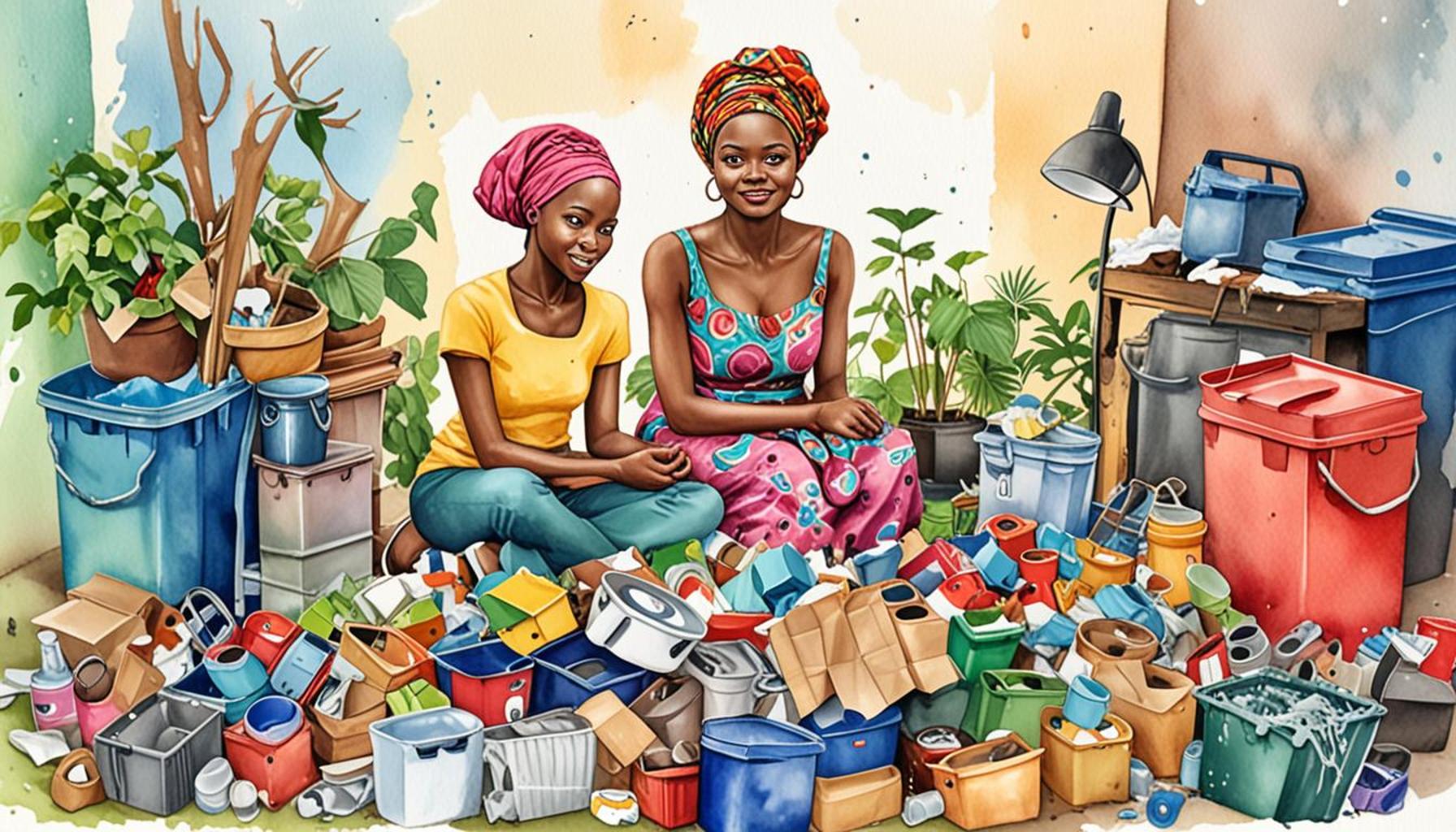Clutter Reduction as a Sustainability Tool: Minimizing Waste and Promoting an Ecological Lifestyle in Nigeria

The Intersection of Clutter Reduction and Environmental Sustainability
As urbanization continues to accelerate in Nigeria, the strain on waste management systems is becoming increasingly evident. Municipalities across the country face the daunting challenge of managing over 65 million tons of waste produced annually. Amidst this crisis, one innovative and effective approach emerges: the practice of clutter reduction. This concept transcends mere organization; it encapsulates a lifestyle choice that significantly contributes to environmental sustainability. By reevaluating consumption habits and prioritizing minimalist living, Nigerians can not only declutter their homes but also take meaningful strides toward environmental stewardship.
One of the most immediate benefits of reducing clutter is waste minimization. Household items that are no longer in use often find their way into landfills, exacerbating waste management issues. By implementing straightforward strategies such as donating, recycling, or repurposing these items, citizens can drastically cut down on the total volume of waste generated. For example, rather than discarding old clothing, individuals can explore options like participating in local clothing swaps or supporting organizations that upcycle these materials into new products.
Furthermore, engaging in clutter reduction fosters resource conservation. The continual demand for new products drives excessive exploitation of natural resources. By opting for a mindful approach to consumption—considering whether a new purchase is truly necessary—Nigerians can collectively decrease the pressure on the environment. Communities can organize ‘buy nothing’ groups or community markets to encourage sharing and trading lightly-used items, thereby creating a circular economy that benefits both people and the planet.
Beyond environmental benefits, a decluttered space has profound implications for personal well-being, thus enhancing quality of life. Research has shown that environments free of excess clutter promote mental clarity and reduce stress. The serene spaces fostered through de-cluttering efforts can lead to better focus and productivity, crucial in bustling urban settings like Lagos or Abuja. Simple practices such as setting aside time for regular decluttering sessions can cultivate a habit of mindfulness, benefiting both one’s mental health and immediate surroundings.
The dialogue around waste management in Nigeria necessitates forward-thinking solutions, and clutter reduction is a vehicle for substantial change. As citizens embrace sustainable practices, they inherently empower themselves to make choices that shape a better future. The adoption of these techniques not only addresses pressing environmental issues but also advocates for a more engaging and responsible way of living. With every small step towards minimizing clutter, residents can contribute to a greener, healthier Nigeria.

LEARN MORE: This related article may interest you
Practical Strategies for Effective Clutter Reduction
A growing focus on clutter reduction in Nigeria brings with it a wealth of practical strategies that every citizen can adopt. Embracing these methods not only helps in creating a sustainable environment but also fosters a culture of minimalism that can dramatically alter consumption behaviors. In a country where the urban population is rapidly increasing, these strategies are vital for managing both personal spaces and community waste.
One effective approach to clutter reduction is engaging in regular decluttering sessions. These intentional efforts can be scheduled based on individual lifestyles, whether it’s a monthly clean-out or seasonal reviews. Incorporating these sessions can help in identifying items that are no longer required, thus laying the groundwork for more sustainable living. People can utilize the 4Rs of waste management: Reduce, Reuse, Recycle, and Rethink. Here’s how they can be applied:
- Reduce: Identify and limit the purchase of unnecessary items.
- Reuse: Look for ways to repurpose items instead of discarding them—an old suitcase could turn into a pet bed, or jars can serve as storage containers.
- Recycle: Familiarize yourself with local recycling facilities and programs to ensure items are disposed of responsibly.
- Rethink: Question the need before making purchases, focusing on quality over quantity.
In addition, technology can play a significant role in facilitating clutter reduction. Digital solutions like inventory apps allow individuals to keep track of items they own, helping to prevent duplicate purchases. Moreover, online platforms for exchanging goods can be strong allies. Websites and social media platforms dedicated to swapping or selling pre-owned items are gaining popularity among Nigerians and can effectively diminish the volume of household clutter.
Another critical aspect of decluttering is the communal approach. Nigerians can participate in community events such as neighborhood cleanups or swap meets, which not only promote clutter reduction but also strengthen community bonds. For instance, local markets can be transformed into venues for exchanges, fostering a culture of sharing and sustainability. This communal effort encourages every individual to view their role in waste reduction not just as a personal responsibility, but as a collective mission vital for the environment.
Furthermore, education and awareness around sustainable practices can significantly influence clutter reduction behaviors. Schools, community organizations, and local governments can collaborate to promote workshops and programs centered on the benefits of decluttering and recycling. By embedding these values into the local culture, the concept of clutter reduction will resonate deeply, culminating in a larger movement toward sustainability in Nigeria.
In summary, practical strategies for clutter reduction provide a tangible way to contribute to sustainability efforts in Nigeria. By committing to regular decluttering, leveraging technology, fostering community initiatives, and enhancing awareness through education, every Nigerian can partake in minimizing waste while promoting an ecological lifestyle.
| Category | Description |
|---|---|
| Waste Reduction | By embracing minimalism, individuals and communities can significantly reduce waste, creating a cleaner environment. |
| Resource Management | Effective decluttering leads to better management of resources, promoting reuse and recycling. |
| Ecological Awareness | A clutter-free lifestyle increases consciousness of environmental impact and encourages sustainable practices. |
| Community Engagement | Encourages discussions and initiatives focused on sustainability within local communities. |
Embracing clutter reduction as a sustainability tool in Nigeria not only minimizes waste but also promotes a healthier ecological lifestyle. By eliminating unwanted items, individuals can create space for sustainable choices, enhancing their quality of life and the environment. As more people engage in minimalism, the community witnesses an uplift in ecological awareness, motivating collective action towards preserving natural resources and adopting environmentally friendly habits.For instance, community-driven initiatives aimed at educating citizens on the importance of recycling and proper waste management have gained momentum. These programs reflect the need for practical solutions that alleviate the waste crisis while fostering community spirit. The promotion of second-hand markets facilitates resource circulation, allowing valuable goods to find new homes, thus minimizing waste and reinforcing an ecological lifestyle.In all these efforts, it is crucial to communicate the benefits of sustainability and how every small action contributes to the collective goal of a cleaner, greener Nigeria.
LEARN MORE: This related article may interest you
Incorporating Clutter Reduction into Daily Practices
To embed clutter reduction within the Nigerian lifestyle, it becomes essential to incorporate it into daily routines. This extends beyond individual actions to include practices within families, workplaces, and communal settings. By weaving these principles into everyday life, clutter reduction transforms into a collective habit that supports an ecological lifestyle.
One promising strategy is the concept of mindful consumption. Nigerians can begin by cultivating a habit of asking essential questions before making purchases—such as “Do I really need this?” or “Can I borrow instead?” This approach minimizes impulse buys, reducing clutter while also encouraging a shift away from consumerist habits that lead to excessive waste. A study conducted by the Nigerian Environmental Society found that mindful shopping can lead to a significant drop in household waste, as consumers become more selective.
Additionally, families can establish clutter-free zones at home. This method involves designating specific areas for certain items with the intention of reducing visual and physical clutter. For example, a corner of a living room could be designated for books, while another area could serve as an arts and crafts station for children. By organizing spaces intentionally, families can create more harmonious living environments, reduce stress, and contribute to a sustainable lifestyle.
Adopting a Circular Economy Mindset
Adopting a circular economy mindset can further enhance clutter reduction efforts in Nigeria. This concept emphasizes the importance of keeping resources in use for as long as possible, minimizing waste through reusing, refurbishing, and recycling goods. Initiatives such as upcycling workshops or local crafting groups can empower individuals to turn obsolete or surplus items into new treasures, effectively cutting down the need for new purchases.
For instance, innovative Nigerians are beginning to create jewelry from discarded plastics and fabrics, illustrating how creativity can play a key role in sustainability. By showcasing these projects on social media platforms, they not only market their work but also inspire others, creating a ripple effect that encourages community participation in waste reduction efforts. Social media groups in Nigeria dedicated to sustainability continue to grow, providing platforms for sharing ideas, tutorials, and best practices related to clutter reduction.
The Role of Government and Policy in Promoting a Sustainable Culture
While individual actions are crucial, government support plays a significant role in promoting a sustainable culture. Policymakers in Nigeria can implement regulations that encourage businesses to produce less waste and consider sustainable materials. The introduction of laws that support extended producer responsibility (EPR) can compel manufacturers to take responsibility for the entire lifecycle of their products, promoting a circular approach that reduces clutter and waste. EPR measures could significantly drive businesses towards developing more sustainable product designs and innovative waste management solutions.
Furthermore, regular awareness campaigns can ensure that citizens remain informed about the importance of clutter reduction. By targeting schools, workplaces, and community centers, these campaigns can facilitate the adoption of eco-friendly practices through workshops, seminars, and community gatherings focused on sustainability. For example, cities could collaborate with NGOs to offer outreach programs that address recycling and decluttering, thus fostering knowledge and enthusiasm around these practices.
Incorporating clutter reduction into the fabric of daily practices within Nigeria does more than minimize waste; it nurtures a culture of sustainability. Through mindful consumption, the establishment of clutter-free spaces, the embrace of circular economy concepts, and committed governmental policies, the path toward a more sustainable and ecological lifestyle becomes achievable for all Nigerians.
SEE ALSO: Click here to read another article
Conclusion
In summary, adopting clutter reduction as a fundamental principle for sustainability in Nigeria holds transformative potential. As individuals, families, and communities engage in practices such as mindful consumption and the establishment of clutter-free zones, they contribute not only to reducing waste but also to fostering a more conscious and deliberate lifestyle. By implementing a circular economy mindset, Nigerians can creatively repurpose materials and find value in what may otherwise be seen as waste, driving innovation and enhancing community resilience.
Moreover, effective governmental policies and awareness campaigns are crucial in reinforcing these grassroots efforts. By advocating for laws that promote extended producer responsibility and supporting educational initiatives, the government can play an integral role in cultivating an ecological culture that resonates throughout society. The convergence of individual actions, communal efforts, and supportive policies will pave the way for a more sustainable future.
Ultimately, embracing clutter reduction is not solely an individual choice; it is a collective commitment towards a greener, cleaner Nigeria. As citizens shift towards eco-friendly practices, they not only mitigate their environmental impact but also inspire future generations to adopt a lifestyle that values sustainability. This journey towards an ecological lifestyle is not just about minimizing waste—it’s about redefining our relationship with the planet and enhancing the quality of life for all Nigerians.


